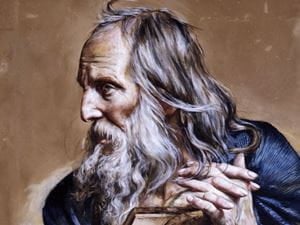
The expression “as old as Methuselah” describes someone who’s really old. It makes sense when you learn about the captivating figure, Methuselah, from the Bible. The Bible says he lived to be 969 years old. Methuselah is an essential figure in the biblical family tree with a genealogy that connects back to Adam and Eve, eventually leading to Noah. Methuselah’s name is culturally connected to growing old, but what explains his age? What does the Bible say about him his relatives, and what can we learn from his story?
Who was Methuselah?
Genesis 5 tells us about Methuselah, the son of righteous Enoch. Enoch was one of only two people in the Bible who didn’t die but were miraculously transported into heaven, detailed explicitly in Genesis 5:24. In 2 Kings 2:11, we learn that the other, Elijah, was taken to God in a whirlwind. When Enoch was 65, he fathered Methuselah, the oldest person on record in history at 969 years old. Methuselah had a son, Lamech, who became Noah’s father, as detailed in Genesis 5:26-29.
It’s interesting to note that Methuselah and Lamech were alive when Noah built the ark, but they died before the flood. Some suggested that Noah’s grandfather Methuselah died the week before the flood, citing that in Genesis 7:1, God told Noah and his family to go to the ark seven days before the rains came. It’s been speculated that these seven days were a mourning period for Methuselah, which was common in humanity’s early history. We can’t know this for sure, but the Bible says that no righteous people were left on earth except Noah and his family when the flood came.
Because righteous Enoch raised Methuselah and Methuselah’s grandson Noah also walked with God, it’s likely that Methuselah was also a godly man. Lamech may have also obeyed God and helped his son build the ark. The family line from Enoch to Noah, descended from Adam’s son Seth, seems to have been God-honoring and the only ones through whom God worked His plan to save the world. Whether Methuselah and Lamech helped to build the ark, we don’t know. But we know there’s much more to the lives of the people we read about than the Bible says.
There were real people with genuine relationships and struggles, just as we have. There’s also much more to the story of Noah building the ark than we know. He worked for years to build it, and it’s doubtful he worked alone. Was Noah preaching the truth to the neighbors who helped him? Did Lamech and Methuselah help? Methuselah would’ve known about God’s coming judgment and the reason for the ark, but God doesn’t mention him as a possible ark occupant. He must’ve known that he would die before the flood and understood that God knows those who are His and delivers them from His judgment. We might not live as old as Methuselah, but if we belong to God, we can have his peace concerning God’s coming wrath on the world.
Why did people in Genesis live so long?
It’s somewhat of a mystery why people in the early chapters of Genesis lived so long. Biblical scholars put forward numerous theories. The lineage in Genesis 5 records the line of Seth’s descendants, the line that would eventually produce the Messiah. Perhaps God blessed this line with exceptionally long lives due to their obedience and godliness. This is a possible explanation, but the Bible doesn’t expressly limit the long lifespans to those mentioned in Genesis 5.
Further, other than Enoch, Genesis 5 doesn’t identify any individuals as being incredibly godly. Everyone during that time likely lived several hundred years. Several factors may have contributed to this. Something happened during the global flood to shorten men’s lifespans. If you compare the lifespans before the flood to those after the flood, you’ll see the ages decreased dramatically and kept decreasing. A key might be in Genesis 6:3, where God says His spirit won’t contend with humans forever because they’re mortal and will only live for 120 years.
Most see this reference to 120 years as the new, divinely appointed limit on man’s lifespan. By Moses’ time, who lived to be 120, lifespans were much lower. After Moses, only one person is believed to have lived past 120, as detailed in 2 Chronicles 24:15. One theory for why those in Genesis lived so long is based on the idea that a canopy of water used to border the earth. The canopy theory says that the water above the firmament created a greenhouse effect, blocking the radiation that currently hits the earth, resulting in ideal living conditions.
In Genesis 7:11, we read that the water canopy was poured out on the earth at the time of the flood, ending that perfect environment. However, the canopy theory has been abandoned by most creationists. Another consideration is that the human genetic code developed some defects in the first few generations after creation. Adam and Even were made perfectly. They were highly resistant to illness and disease, and their descendants would’ve inherited these advantages, albeit to lesser degrees. Over time, due to sin, the human genetic code became increasingly corrupted, and humans became more susceptible to disease and death, resulting in drastically reduced lifespans.
In the 2014 film “Noah,” Methuselah is portrayed as an eccentric witch doctor. The Bible doesn’t say anything about Methuselah to confirm or deny this portrayal, but it seems highly questionable, considering the family lineage from Adam to Noah in Genesis 5 is the honorable line that obeyed the Lord. We know very little about Methuselah, the oldest person in the Bible. He lived to be 969 years old and died the same year as the flood.
He was Adam’s great-great-great-great-great grandson and Noah’s grandfather. Methuselah was probably a godly man to have been blessed by God with such a long lifespan. Methuselah is an essential figure in the biblical family tree, whose name has become synonymous with growing very old.

